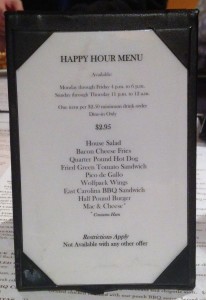Across the United States, happy hour regulations are anything but settled law (pdf). In some states, happy hour is simply prohibited altogether. For instance, there has been a ban on happy hour in Massachusetts since 1984 after a driver allegedly hit and killed a woman following happy hour at a South Shore bar. Recent proposals to build casinos in Massachusetts have spurred discussions as to whether the ban on happy hour should be lifted in the state. However, after several public hearings and feedback from business owners and concerned citizens, the ban will remain in place.

Surprisingly, the majority of bar and restaurant owners are against lifting the ban and are worried that doing so will increase competition and lead to a “race to the bottom.” One owner commented that restaurants like his compete on the basis of food, drinks, service, atmosphere, and music. In his opinion, if the regulation banning happy hour were to change, price would become the primary competitive factor that patrons would consider.
In Illinois, another state that completely banned happy hour, restaurant owners have been forced to get creative. Following the ban, they began offering “happy days,” during which reduced prices on drinks or specials were extended throughout the entire day. This practice conformed to state law which prohibits the change of drink prices during any one business day. This “extend across the day” regulation is also the law in North Carolina. Since most business owners are unwilling to offer drink specials from the time the business opens until the time it closes, some establishments attempt to draw business by offering happy hour food specials instead.
Although restaurants have been able to advertise happy hour within and directly outside of their own establishments, they have not been able to advertise using social media, radio, television, or newspaper advertisements.
In other states, although happy hour is not prohibited, there are restrictions on both the number of hours that restaurants can hold happy hour each week and on pricing and advertising. For example, since 1985 it has been illegal for Virginia restaurants to advertise the days and times of their happy hour, with some exceptions. Currently, happy hour may be advertised inside the particular establishment, as well as directly outside the establishment on a 17×22-inch sign. The sign exception has been in effect since 2010. Although restaurants in Virginia have been able to advertise within and directly outside of their own establishments, they have not been able to advertise using social media, radio, television, or newspaper advertisements. However, the restrictions on advertising are scheduled to be amended.

Later this year, Governor McDonnell will likely sign off on a Virginia Alcohol and Beverage Control recommendation. With the change, restaurants will be able to advertise the time of their happy hour, but not the specific happy hour drink specials. Once Governor McDonnell approves the change, it will be another thirty days before the change takes effect.
Many states have absolutely no restrictions on happy hours, leaving the regulation of such events to the local governments. Georgia and Colorado are among these states. The differences between complete prohibition in some states, no prohibition in others, and states with regulations in between these two extremes leaves business owners with locations in multiple states varying their business practices in order to conform. Owners must stay informed about the law in each state where they are doing business, limit their advertising based on the applicable law, and ensure that their happy hours do not exceed the maximum number of hours allowed per day and collectively per week.
For the most part, happy hour regulations have been historically uncontested due to the states’ broad authority to regulate the manufacture and sale of intoxicating beverages.
In the past, there has been little in the way of litigation over happy hour regulations. In DDDJ, Inc. v. Ohio Liquor Control Commission, however, the Ohio Court of Appeals held that a regulation that prohibited permit holders from selling liquor at reduced happy hour prices after 9:00 p.m. was reasonable and consistent with the General Assembly’s delegation of power to the Liquor Control Commission. Furthermore, the Court held that the regulation was not unconstitutionally vague. Yet for the most part, happy hour regulations have been historically uncontested due to the states’ broad authority to regulate the manufacture and sale of intoxicating beverages.

Regardless of the economic reasons for or against banning happy hour, legislators, citizens’ groups, and other organizations remain concerned with discouraging excessive consumption of alcohol and drunk driving. The Substance Abuse and Mental Health Services Administration, part of the U.S. Department of Health and Human Services, actively opposes happy hour promotions and offers like-minded opponents advice (pdf) on how to mobilize members of the community and local leadership for the purpose of raising public awareness and passing stricter regulations.
Despite seemingly conflicted interests, some states such as Virginia have managed to balance happy hour restrictions between the two extreme stances taken. Allowing restaurants to host happy hour does not necessarily prevent the state from simultaneously protecting public interests. The states can implement and enforce restrictions limiting advertising as to the price of happy hour drinks, while still allowing restaurants to advertise. States can also restrict happy hour to certain hours of the day, prevent drinks from being discounted, and many other similar restrictions. While some states have successfully obtained such a balance, the question remains as to whether states currently prohibiting happy hour altogether will eventually lift the ban.
